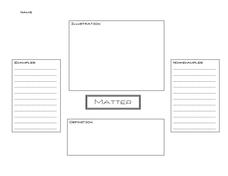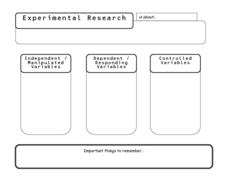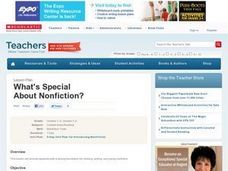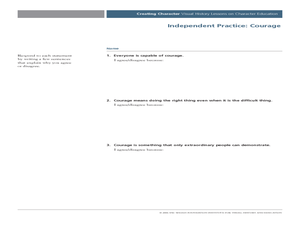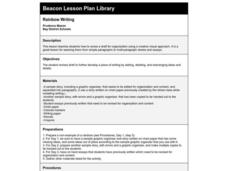Open Oregon Educational Resources
Digital Foundations: Introduction to Media Design with the Adobe Creative Cloud, Revised Edition
How can Adobe Creative Cloud enhance digital art and media design? Readers explore just that with the Digital Foundations eBook. They learn how to source images and how to create symmetry and asymmetry in their digital designs. They also...
Institute for the Professional Development of Adult Educators
Using Context Clues with Signal Words
When you come across an unfamiliar word in a text, do you skip it and move on? Practice using context clues to identify words you don't know with a thorough set of language arts lessons. The resource reinforces close reading and critical...
NPR
Suffrage Lesson Plan
Has life changed for American women in the last century, or are there common themes between the lives of 21st century women and the struggle of suffragettes from the 1910s? Explore the ways media reflects the position of women...
Do2Learn
Respecting the Ideas of Others
Communicating clearly is one part of a successful conversation, but listening to others is just as important. Individuals with special needs plan calm responses and reactions to differing opinions with a collaborative activity.
Museum of Disability
A Picture Book of Louis Braille
Teach kids about the beginnings of the Braille writing system with a lesson about Louis Braille. A series of discussion questions guide young readers though A Picture Book of Louis Braille by David A. Adler, and once they finish the...
Curated OER
Take Effective Class Notes: Strategic Note-Taking
Your class members will feel confident in taking notes during your next lecture with this great note-taking worksheet, through which learners practice activating prior knowledge, recording key points, flagging...
Curated OER
Matter
In this matter worksheet, students complete a graphic organizer for matter. They include examples, illustrations, non-examples and the definition.
Curated OER
Reaction Types Worksheet
In this reaction types worksheet, students complete a graphic organizer by determining what type of reaction is shown in the example given.
Curated OER
Characterization
In this characterization worksheet, learners fill out a graphic organizer chart. Students write the character's name in the center and an example of each of the 4 characterization methods by the author. There are instructions to help.
Curated OER
Properties of Matter
In this properties of matter worksheet, students complete a graphic organizer that includes 2 types of matter, 2 examples of each type of matter and a description of each type.
Curated OER
Experimental Research
In this experiment worksheet, students give examples of independent, dependent, and controlled variables. This worksheet is a graphic organizer.
Curated OER
Newton's Laws
In this motion worksheet, students read about the 3 laws of motion and then complete a graphic organizer describing the laws and giving an example for each one.
Curated OER
What's the Matter?
Students explore matter. In this matter and technology lesson, students locate examples of solids, liquids, and gases inside and outside the classroom, and record their findings in a graphic organizer. Students listen to the...
Curated OER
T-Charts
In this literacy worksheet, students use the t-charts that are designed for the specific activity. The sheet is a teacher's guide to making them.
Curated OER
What Are Solutions?
In this solutions worksheet, students brainstorm different types of solutions and an example of each type of solution. This worksheet is a graphic organizer.
Curated OER
Compare Characters in Bud, Not Buddy
After your class finishes reading Bud, Not Buddy by Christopher Paul Curtis, they use the Venn diagram here to compare two characters from the novel, in this case Bud and his grandfather Herman E. Calloway. Examples of qualities on which...
Curated OER
What's Special About Nonfiction?
Students examine the difference between nonfiction and fictional writing. They identify the characteristics of nonfiction literature and examine how a nonfiction textbook organizes information.
Curated OER
Creating Character: Courage
Students explore the concept of courage, both in themselves and in others. In this history and character education lesson, students discuss the characteristics of courage and what it means and how one can show it. Students listen to...
Curated OER
Tree Brains
Seventh graders use a tree as a graphic organizer for a prewriting strategy. Some of the "trees" are used to create verbal paragraphs for practice.
Curated OER
Vocab Grabbing the Preamble to the U.S. Constitution
Students identify concrete and abstract nouns in the preamble to the Constitution, and complete Frayer Model graphic organizers using history and current events as examples of American values. In this preamble lesson plan, students use...
Curated OER
Rainbow Writing
Students examine how to use a rainbow picture as a graphic organizer through the use of color-coding. They produce a writing piece using this graphic organizer. They expand their writing from simple paragraphs to multi-paragraph stories.
Curated OER
Inside Information
Students research and write reports about inventions and inventors. They develop graphic organizers to organize their information, and create reports on the impact of inventors and inventions.
Curated OER
Economic Concepts and Definitions
Third graders identify producers and consumers in SE Utah and Four-Corners communities. They identify the factors that determine economic development and name some occupations in their community. They show and share their graphic...
Curated OER
Descriptive Writing Using the Book Rumpelstiltskin
Use the fairy tale Rumpelstiltskin to teach your third grade class about descriptive writing. Following a teacher read-aloud of the story, the class brainstorms a list of adjectives describing the main character. Students use this list...






